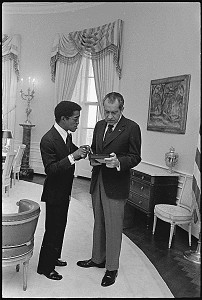
The entertainer pictured in 1973 with Richard Nixon. Davis was criticized by some African-American leaders for palling around with the conservative President.
Billed as “the greatest entertainer in the world” during his lifetime, Sammy Davis Jr. probably had as much claim to the title as anyone. But being that good at singing, dancing, etc., doesn’t come without a price. In Sammy’s case, the cost was education. Practically raised on stage by parents who were vaudeville performers, the school-age Davis received some tutoring in rudimentary reading backstage in between shows.
In an interview in Playboy’s December 1966 issue, Davis remembered how his service in the Army provided an opportunity for him to further his knowledge of literature. An excerpt:
“Playboy: Is it true, as some writers have claimed, that you could barely read and write, that you’d never even gone to kindergarten?
Sammy Davis Jr.: Yeah, it’s true. What’s more, I’ll be turning 40 this year, and I still haven’t gone to kindergarten. Haven’t spent a single day in school my whole life. I say that with mixed emotions. I’m very proud in one sense; I’m very ashamed in another. For instance, you know I’m always being asked for autographs. Say a girl tells me, ‘My name is Rosemari, with an ‘i”. Well I don’t know how to spell the names. I can’t hardly write anything but my own name. It’s a constant, daily embarrassment.
It’s even more of an embarrassment because of my articulate facade. People think, ‘Why, he’s got to have education.’ But I can’t even write! Nothing but chicken scratches! That I’m not proud of. I’m proud that I’ve pulled myself up by my own bootstraps, with the help of some people who cared enough; but I’m not proud of having no education. What little I do have started on the road, when Will Mastin and my dad found someone around the theaters to tutor me to read and write. We’d work between shows in the dressing room—when there was a dressing room—until it was time for me to go on for the next show.
Then in the Army, like I told you, this sergeant took a liking to me and started me reading books. Things like The Picture of Dorian Gray by Oscar Wilde, and some of Carl Sandburg’s books about Lincoln; books by Dickens, Poe, Twain; and a history of the U.S. I would read every minute of the day I had free, then in my bunk until taps, then in the latrine until after midnight. At the PX I bought a pocket dictionary, and I would look up words in places where nobody would see me, then I’d read the books over again. Imagine somebody 18 years old, grown, discovering the thrills of Robinson Crusoe for the first time—reading that kids of 10 take for granted. And a showbiz kid is already 10 years up on the average cat, in street-knowledge terms.
Like, man, I’d had my first serious affair at 14, and at 18 I still didn’t know what a serious book was. That’s a sad paradox. I remember so well the first book I ever read about my own people, and the effect it had on me. It did something to me. That was Native Son, by Richard Wright. Then, later, I read Black Boy. They made me feel something about being black that I had never really felt before. It made me uncomfortable, made me feel trapped in black, you know, in a white society that had created you the way it wanted, and still hated you.”
Tags: Sammy Davis Jr.
